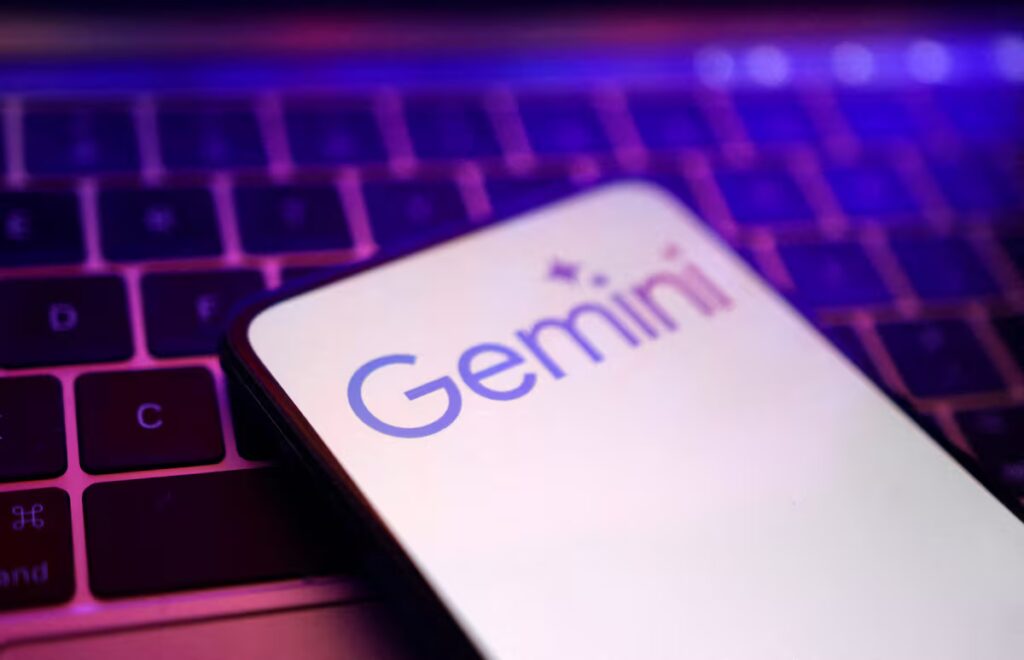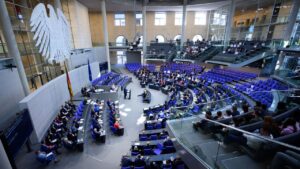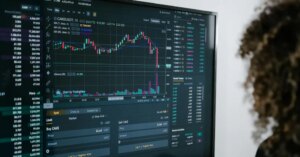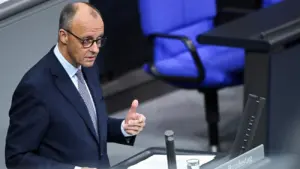
America’s big tech companies no longer travel together. Suspicions about its ability to make its high investment plans in artificial intelligence profitable, linked to very high valuations, have fueled fears of bursting a bubble, but for now the market opts for segregation. Thus, since last October 9, Oracle has reached historic peaks on the stock market and after signing millionaire agreements with OpenAI, xAI and Meta related to AI, its stock has collapsed by 32.6%. In the same period, Alphabet rose by 32% and Nvidia, already an icon of this digital revolution, lost more than 5%. Their accounts, although better than expected, did not completely clarify the doubts.
Is artificial intelligence a bubble ready to burst? In recent weeks, investors and strategists have been busy trying to answer this question, for now with the victory of “no”… Although the debate ended with the sale of around $10 billion in shares of large American technology companies in the last four weeks, according to data from Bank of America. A collection of profits led by institutional investors and carried out by small investors. Strategists at JP Morgan Private Banking believe that the exuberance seen in the markets since the launch of ChatGPT in late 2022 has kept investors “fascinated” by the promises of artificial intelligence, but rule out that there is “a bubble about to burst”. “Whether bullish or bearish, AI will almost certainly be the most important factor driving stock market returns in the coming years,” they add.
However, not all companies fall into the same category and the market is already clearly distinguishing between different business models and funding sources and looking for new winners in the AI ecosystem. Nvidia, the all-powerful chipmaker, fell 4% at the close of European stock markets yesterday, dragging down some of its key partners, such as Oracle, Super Micro and CoreWeave, which posted smaller cuts. The reason? Alphabet’s latest progress in the development of tensor processing units (TPUs) has led analysts to see changes in an AI chip market dominated by Nvidia and which was joined last week by the presentation of the new version of its AI model, Gemini 3.0, with better results than those of the latest version of ChatGPT. A “new Deepseek moment” – the AI language model of Chinese origin that generated turbulence in stock markets at the end of January due to the high cost savings it represented compared to the OpenAI tool –, according to Nomura, which adds a new destabilizing element.
“Nvidia sells chips. Alphabet owns the whole package: chips, data centers and cloud services,” says Ruben Dalfovo, investment strategist at Saxo Bank. A pressure to which would also be added the possibility of a millionaire alliance between Alphabet and Meta to power the data centers of the parent company of Facebook, Instagram and WhatsApp.
Added to all this is the landing of Berkshire Hathaway in its capital through the purchase of 17.85 million shares for a value of approximately 4.3 billion dollars. The support for Google’s parent company by the holding company created by Warren Buffett, placing it as his tenth investment, also coincides with the reduction of his stake in Apple, the value of which he got rid of with a package of around 42 million shares between June and September, leaving his position with a value of around $61 billion. “Buffet has often said that not buying Google years ago was a mistake,” recalls the Saxo Bank expert, who adds that the investment in Alphabet is “a partial repair, but also a bet on the future.”
Goldman Sachs point out that “Alphabet has overcome the ‘wall of concern’ over the past 12 months on the topic of artificial intelligence, and we see no reason to suspect a pause or setback in its operational developments that would change investor perceptions.” A bet that appears to be a safe bet in the eyes of investors, with recurring revenue deriving from the online advertising business and from cloud and this raises no doubts about its financing capacity.
And if until recently they used their own money to finance their large investments capexSo far in 2025, the five largest AI hyperscalers – Amazon, Alphabet, Microsoft, Meta and Oracle – have issued more than $100 billion in bonds, together keeping debt levels still low.
This is not the case for Oracle, which turned massively to the bond market to finance its growth plans following the deal with OpenAI after seeing the liquidity it had in its coffers disappear. Doubts about the profitability of its activities are reflected both in the evolution of its shares, which move away from the highs, and in the insurance against the default of its bonds. These derivatives, known as credit default swaps (CDS), have jumped to highs of 118 basis points in 2022, falling prey to speculative investors who have seen how S&P Global Ratings puts Oracle’s debt in a negative outlook “due to its credit profile stressed by the capex planned and debt issuance to finance the accelerated growth of AI infrastructure.”
Added to all this is the end of a season of results that did not help dispel doubts about the big technology companies. According to data from Factset, in the third quarter Apple, Microsoft, Alphabet, Amazon, Nvidia, Meta and Tesla, the so-called “magnificent seven”, recorded the smallest rebound in their profits since the first quarter of 2023. Overall, their profits rose 18.4% between June and September, below the average of 28.8% recorded in the previous four quarters.





